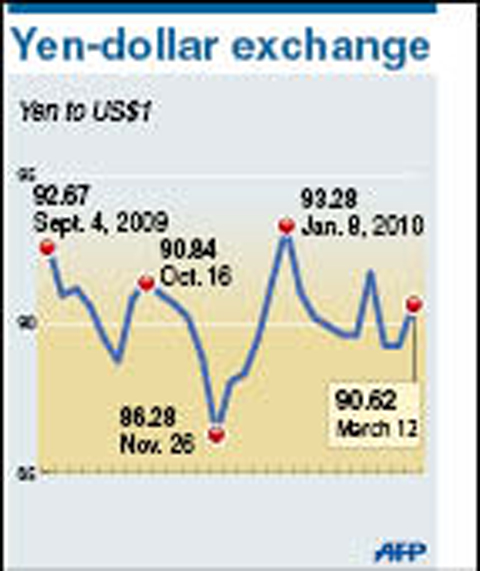The US dollar and yen fell versus all of their major counterparts as concern eased about a Greek default and European and US reports signaled the economic recovery is accelerating, fueling appetite for riskier assets.
The euro touched a one-month high versus the greenback as stocks gained for a second week. The yen fell against all 16 of its most-traded peers as Japanese officials said the government is ready to intervene to keep the currency from strengthening.
The US dollar slid 1 percent to US$1.3769 per euro in New York, from US$1.3626 on March 5. It touched US$1.3796 on Friday, its weakest level against the 16-nation currency since Feb. 11. The yen depreciated 1.4 percent to ¥124.69 per euro, from ¥123 a week ago. The greenback rose 0.3 percent to ¥90.56, its second weekly gain, and reached ¥91.09 on Friday, its highest level since Feb. 23.

The pound fell for a fourth consecutive week against the euro, the longest run of declines since July, on concern the next UK government may not be strong enough to cut the country’s burgeoning budget deficit.
The pound weakened about 0.6 percent against the euro in the week to £90.58 per euro as of 5:03pm in London on Friday. Sterling climbed 0.3 percent against the greenback to US$1.5187.
Asian currencies rallied this week, led by the Malaysian ringgit and South Korea’s won, as improving economic data and reduced concern about Greece’s debt crisis spurred demand for regional assets.
The ringgit strengthened 1.9 percent from its March 5 close to 3.301 per US dollar, according to data compiled by Bloomberg. It was the biggest weekly gain in five months and the currency on Friday touched a 19-month high of 3.300. The won climbed 1.1 percent to 1,128.20, the Philippine peso rose 0.9 percent to 45.65 and Indonesia’s rupiah appreciated 0.7 percent to 9,155.
The New Taiwan dollar appreciated 0.6 percent this week to NT$31.840 against its US counterpart at the 4pm close, according to Taipei Forex Inc. It touched NT$31.727 on Friday, the strongest level since Feb. 6.
The Thai baht gained 0.2 percent in the past week to 32.57 against the US dollar.

MORE VISITORS: The Tourism Administration said that it is seeing positive prospects in its efforts to expand the tourism market in North America and Europe Taiwan has been ranked as the cheapest place in the world to travel to this year, based on a list recommended by NerdWallet. The San Francisco-based personal finance company said that Taiwan topped the list of 16 nations it chose for budget travelers because US tourists do not need visas and travelers can easily have a good meal for less than US$10. A bus ride in Taipei costs just under US$0.50, while subway rides start at US$0.60, the firm said, adding that public transportation in Taiwan is easy to navigate. The firm also called Taiwan a “food lover’s paradise,” citing inexpensive breakfast stalls

TRADE: A mandatory declaration of origin for manufactured goods bound for the US is to take effect on May 7 to block China from exploiting Taiwan’s trade channels All products manufactured in Taiwan and exported to the US must include a signed declaration of origin starting on May 7, the Bureau of Foreign Trade announced yesterday. US President Donald Trump on April 2 imposed a 32 percent tariff on imports from Taiwan, but one week later announced a 90-day pause on its implementation. However, a universal 10 percent tariff was immediately applied to most imports from around the world. On April 12, the Trump administration further exempted computers, smartphones and semiconductors from the new tariffs. In response, President William Lai’s (賴清德) administration has introduced a series of countermeasures to support affected

CROSS-STRAIT: The vast majority of Taiwanese support maintaining the ‘status quo,’ while concern is rising about Beijing’s influence operations More than eight out of 10 Taiwanese reject Beijing’s “one country, two systems” framework for cross-strait relations, according to a survey released by the Mainland Affairs Council (MAC) on Thursday. The MAC’s latest quarterly survey found that 84.4 percent of respondents opposed Beijing’s “one country, two systems” formula for handling cross-strait relations — a figure consistent with past polling. Over the past three years, opposition to the framework has remained high, ranging from a low of 83.6 percent in April 2023 to a peak of 89.6 percent in April last year. In the most recent poll, 82.5 percent also rejected China’s

PLUGGING HOLES: The amendments would bring the legislation in line with systems found in other countries such as Japan and the US, Legislator Chen Kuan-ting said Democratic Progressive Party (DPP) Legislator Chen Kuan-ting (陳冠廷) has proposed amending national security legislation amid a spate of espionage cases. Potential gaps in security vetting procedures for personnel with access to sensitive information prompted him to propose the amendments, which would introduce changes to Article 14 of the Classified National Security Information Protection Act (國家機密保護法), Chen said yesterday. The proposal, which aims to enhance interagency vetting procedures and reduce the risk of classified information leaks, would establish a comprehensive security clearance system in Taiwan, he said. The amendment would require character and loyalty checks for civil servants and intelligence personnel prior to